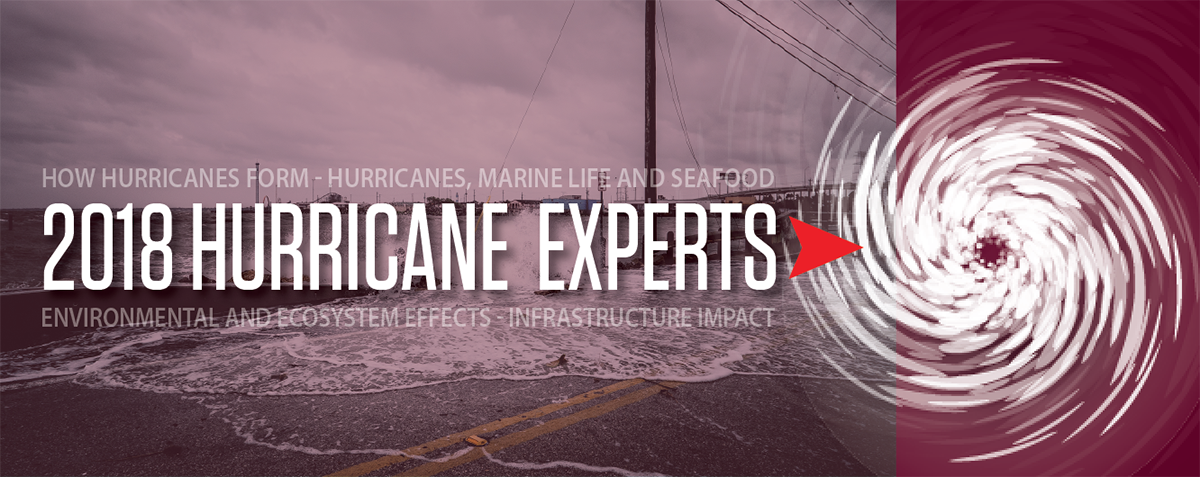Geosciences Hurricane Experts Guide
Aggie geoscientists are available to the media for scientific analysis and expertise as the 2018 hurricane season begins.
Jun 12, 2018

Hurricane season began June 1, and the following experts from within the College of Geosciences at Texas A&M University are available to discuss hurricanes and related issues. For experts in other fields, see the full Texas A&M hurricane expert guide.
How Hurricanes Form, Storm Severity
- John Nielsen-Gammon, Regents Professor of atmospheric sciences, Texas A&M University College of Geosciences
- Nielsen-Gammon serves as Texas State Climatologist and is an expert on severe storms, how hurricanes form, the history of Texas hurricanes, rapid formation of hurricanes in the Gulf of Mexico and the history of severe storms and hurricanes in the past 150 years.
- Contact: (979) 862-2248 or n-g@tamu.edu
- Tim Logan: Instructional assistant professor of atmospheric sciences in the Texas A&M University College of Geosciences
- Logan is an expert in severe storms, the formation of storms and lightning, and the damage caused by severe storms and hurricanes.
- Contact: (979) 845-2004 or tlogan52@tamu.edu
- Robert Korty, associate professor of atmospheric sciences, Texas A&M University College of Geosciences
- Korty is an expert on how hurricanes affect oceans and how climate affects hurricanes.
- Contact: (979) 847-9090 or korty@tamu.edu
- Courtney Schumacher: Professor of atmospheric sciences in the Texas A&M University College of Geosciences
- Schumacher is an expert in tropical meteorology, large mesoscale convective systems, radar meteorology, and mesoscale-climate interactions.
- Contact: (979) 845-5522 or cschu@tamu.edu
Structural Damage, Water Damage, Off-shore Structures
- Christine Hale: Texas Sea Grant oil spill science extension specialist at Texas A&M University - Corpus Christi
- Hale has expertise in the offshore oil industry regulations and practices, impacts of oil spills on the coastal and marine environment, methods to contain and clean-up spills, and emergency response.
- Contact: (361)825-6215 or hale@tamu.edu
- Brent McRoberts, research assistant professor of geography, Texas A&M University College of Geosciences
- McRoberts is an expert in power outage prediction modeling, which gives forecasts of how many utility customers will lose power during and after a hurricane.
- Contact: (979) 845-6075 or mcrobert@tamu.edu
Environmental and Ecosystem Effects of Hurricanes
- Shari Yvon-Lewis, professor and department head in the Department of Oceanography, Texas A&M University College of Geosciences
- Yvon-Lewis is an expert in chemical oceanography, trace gas biogeochemistry, and has conducted extensive post-hurricane research in Galveston Bay.
- Contact: (979) 458-1816 or syvon-lewis@ocean.tamu.edu
- Jessica Fitzsimmons, oceanography assistant professor, Texas A&M University College of Geosciences
- Fitzsimmons is an expert in chemical oceanography and biogeochemistry. She has conducted extensive post-hurricane research in Galveston Bay.
- Contact: (979) 845-5137 or jessfitz@tamu.edu
- Anthony Knap, director of GERG and professor of oceanography, Texas A&M University College of Geosciences
- Knap is an expert in effects of contaminants on marine environments, ocean health and human health interactions. He also co-leads the Texas A&M Superfund.
- Contact: (979) 458-9328 or tknap@tamu.edu
- Lisa Campbell, professor of oceanography, Texas A&M University College of Geosciences
- Campbell is an expert in biological oceanography, phytoplankton ecology, and harmful algal blooms; she is well-versed in the effects hurricanes can have on ecosystems.
- Contact: (979) 845-5706 or lisacampbell@tamu.edu -
- Jason Sylvan, assistant professor of oceanography in the Texas A&M University College of Geosciences
- Sylvan is an expert in Biological Oceanography: Microbial Ecology, Geomicrobiology, Deep Biosphere, Hydrocarbon Microbiology, and can discuss the short-term and long-term effects of hurricanes on environments and ecosystems, including coral reefs.
- Contact: (979) 845-5105 or jasonsylvan@tamu.edu
- Kathryn Shamberger, assistant professor of oceanography in the Texas A&M University College of Geosciences
- Shamberger is an expert in chemical oceanography, ocean acidification, and seawater carbonate chemistry, as well as the short-term and long-term effects of hurricanes on environments and ecosystems, including coral reefs.
- Contact: (979) 845-5752 or shamberger@tamu.edu
- Steve DiMarco: Professor of oceanography and team leader for ocean observing in the Geochemical and Environmental Research Group at Texas A&M, in the Texas A&M University College of Geosciences
- DiMarco is an expert in ocean observing systems and data, as well as the short-term and long-term effects of hurricanes on environments and ecosystems, including coral reefs.
- Contact: (979) 862-4168 or sdimarco@tamu.edu
Warnings, Recovery and Resilient Coastal Communities
- Heather Wade: Senior associate director, Texas Sea Grant College Program, co-director, Community Resilience Collaborative (CRC)
- Wade is an expert in environmental hazards management, hazard mitigation, post-disaster redevelopment planning, and evaluating how well communities are prepared for and can recover from hurricanes. She co-leads the CRC, a research-and-extension-based planning program to increase the resilience of the state’s coastal communities to natural hazards and to enhance or restore their habitats and ecosystems.
- Contact: (361) 205-7503 or hwade@tamu.edu.
Hurricanes and Marine Life, Seafood
- Laura Picariello: Extension fisheries specialist, Texas Sea Grant
- Picariello has experience working with commercial fisheries, both in Texas and across the Gulf of Mexico.
- Contact: lpicariello@seagrant.tamu.edu
- Andrew Ropicki, assistant professor and Texas Sea Grant marine economics extension specialist,
- Ropicki can comment on assessments of storm impacts on fishing infrastructure (vessels, docks, processing equipment, etc.) and on sessile fisheries (oysters).
- Contact: (361) 825-6210 or ropicki@ag.tamu.edu
For more information, contact: Robyn Blackmon, Texas A&M College of Geosciences communications manager, (979) 845-6324 or robynblackmon@tamu.edu; or Leslie Lee, Texas A&M College of Geosciences communications coordinator, (979) 845-0910 or leslielee@tamu.edu.
